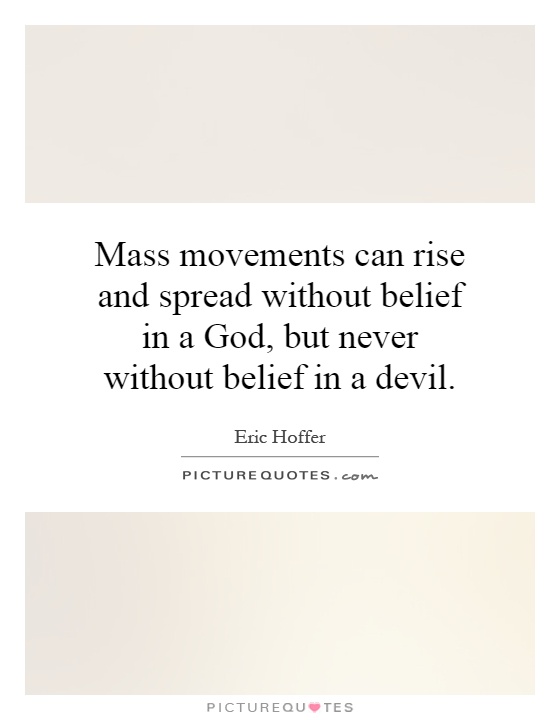Mass movements can rise and spread without belief in a God, but never without belief in a devil

Mass movements can rise and spread without belief in a God, but never without belief in a devil
Eric Hoffer, a renowned American philosopher and author, once famously said, “Mass movements can rise and spread without belief in a God, but never without belief in a devil.” This statement holds profound implications for understanding the nature of mass movements and the role of belief systems in shaping human behavior.Hoffer’s observation suggests that while a belief in a higher power may not be necessary for the formation of a mass movement, a common enemy or adversary is essential for uniting individuals under a common cause. In other words, it is not the presence of a positive belief in a God that drives people to join together in a mass movement, but rather the presence of a negative belief in a devil or enemy that unites them in a shared sense of purpose and identity.
Throughout history, we have seen numerous examples of mass movements that have been fueled by a belief in a common enemy. From political revolutions to religious crusades, from social justice movements to nationalist uprisings, the rallying cry of “us against them” has been a powerful force in mobilizing people to action. In many cases, the demonization of the perceived enemy serves to dehumanize them and justify acts of violence and aggression in the name of a greater cause.
Hoffer’s insight into the role of belief in shaping mass movements is particularly relevant in today’s world, where we see the rise of populist movements, extremist ideologies, and polarizing rhetoric that seek to divide rather than unite. In an era of increasing political polarization and social unrest, it is more important than ever to critically examine the beliefs that drive us to action and consider the consequences of demonizing others in the pursuit of our own agendas.
Ultimately, Hoffer’s words serve as a reminder of the power of belief in shaping human behavior and the importance of fostering empathy, understanding, and cooperation in the face of adversity. By recognizing the humanity of others and seeking common ground rather than division, we can work towards building a more inclusive and compassionate society for all.












 Friendship Quotes
Friendship Quotes Love Quotes
Love Quotes Life Quotes
Life Quotes Funny Quotes
Funny Quotes Motivational Quotes
Motivational Quotes Inspirational Quotes
Inspirational Quotes